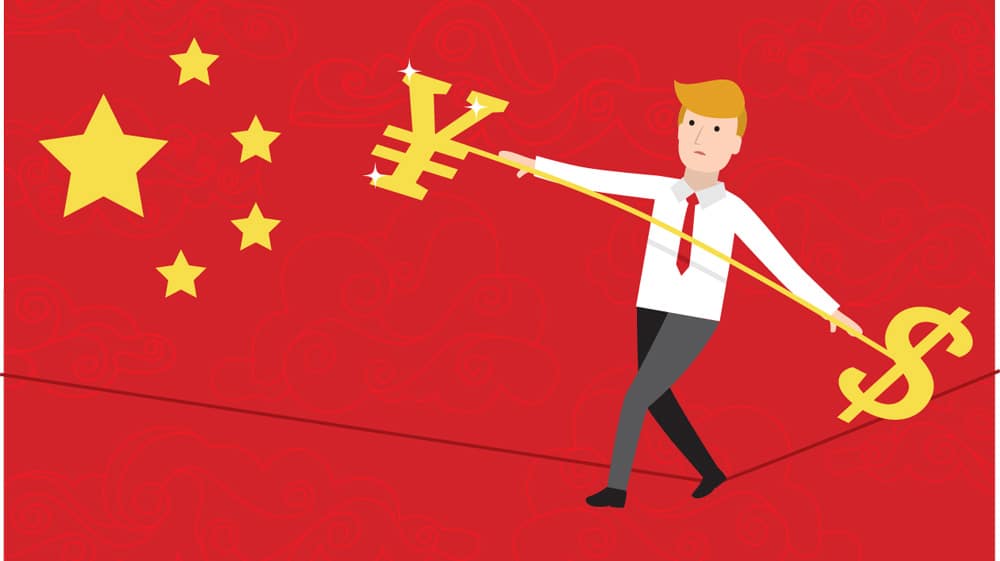There are echoes of past US presidents as the Chinese government shuts down debate of its current economic problems. Mark Godfrey reports from China.
You wouldn’t have thought there’s any financial crisis brewing if you watch the Xinwen Lianbao, China’s main daily TV news show, which recently led with President Xi Jinping’s warning against any teaching of “western capitalist values” during visits to Beijing’s Communist Party School – a network of academies for aspiring party talent.
Railing against things western and capitalistic is a priority for the current Chinese administration, which is all the more absurd given revelations that the president’s brother-in-law was one of those named in the very capitalist practice of managing corporate wealth through a shelf company in Panama. The niece of iconic Communist Party leader Deng Xiaoping is also revealed to have had such a company, to manage her wealth in the Tibet 5100 Spring Water Co – a large corporation with a monopoly to supply bottled water on Chinese high-speed railways. The son-in-law of recently retired Communist Party leader Jia Qinglin is yet another Panama Papers figure.
All of this is censored, non-news in China. But thankfully, many Chinese are aware that the president and most of his colleagues send their children to US business schools – and many have picked up lucrative jobs in US investment banks – so the hypocrisy of the appeal against “western capitalist values” will be seen for what it is.
TRANSPARENCY
But these are gloomy times when what’s needed is some honesty and light on the Chinese economy from the Xi administration. It’s almost a year since the Chinese stock market crashed due to government mismanagement of a currency devaluation, but the government’s subsequent inability or unwillingness to communicate its economic intentions and plans did long-term damage to investors’ faith in China and in its currency.
Over the past year, Beijing has expended vast sums on propping up the stock market and the currency through, for instance, forcing the state-dominated finance sector to buy shares. All the while there has been mass capital flight as worried investors – many of them Chinese – get their money out to perceived safe havens.
POWER TO INFLUENCE
And yet instead of frankness to inspire some confidence, China’s government has ordered media and economic think tanks to be more positive about the economy. And it has outspoken tycoon Ren Zhiqiang on ‘probation’ for critical comments on economic policy – the kind of thing you expect from a tycoon.
Donald Trump blames the off-shoring of US jobs and wealth to China for unemployment at home
And while the China Securities Financial Corp, one of the country’s fund vehicles used to buy shares, has lost 12% of its value over the past year, the government is doing exactly the things which the Xi economic team had promised not to do. That is, they’re priming the economy on easy credit to industry and infrastructure, facilitated through control of the country’s enormous banks, already creaking under a load of debt from a 2009 mega-stimulus. And this of course exacerbates the problems of over-capacity that have been around some time and which are starting to manifest themselves overseas in the form of cheap Chinese steel, which threatens the future of steel production in the EU, US, India and elsewhere. It’s a similar story with products like chemicals and cement, and one wonders how Irish-based CRH ever made any money from its investment in Chinese cement factories.
MISSING LINKS
While it made much of building a new economic model based on domestic consumption and services, the Chinese Communist Party, given it has no mandate to rule but has been credited with China’s economic expansion over three decades, is sticking with the old model that worked in the past lest China’s economy slow too fast and millions of unemployed workers go out on the streets.
The son-in-law of recently retired Communist Party leader Jia Qinglin is yet another Panama Papers figure
China’s current economic challenges impact western economies much more than in earlier decades and have been key to the success of Donald Trump, who blames the off-shoring of US jobs and wealth to China for unemployment at home. Just as Chinese policymakers are stuck in a time warp, there is also an interesting repetition of history in the US presidential elections. It was the Bill Clinton presidency – with enthusiastic backing from corporate America – that embraced China into the world’s economic system, and principally the World Trade Organisation. Membership allowed China to soak up the kind of investment, technology and export market access that gave it a giant manufacturing sector and the jobs to ultimately create a middle class that today spends an awful lot of money on western consumer products.
OUT IN THE COLD
China, however, didn’t become more open and transparent – that was Bill Clinton’s expectation – in embracing the People’s Republic into the global system so soon after the slaughter of Tiananmen Square in 1989. Hillary Clinton has promised to be a lot less accommodating: she’s promising to be tougher in limiting China’s enthusiasm for cyber espionage and for occupying islands also claimed by US allies. But then she has to say that, given how Trump has made it such a big issue.
So we’re all bound up in China’s problems now. But China, it seems, is too busy fighting the very ‘western capitalism’ that the country – and certainly its elites – rode to such success to have any frank discussion of its current problems.

